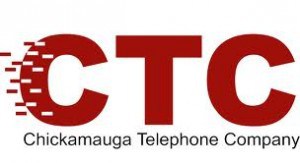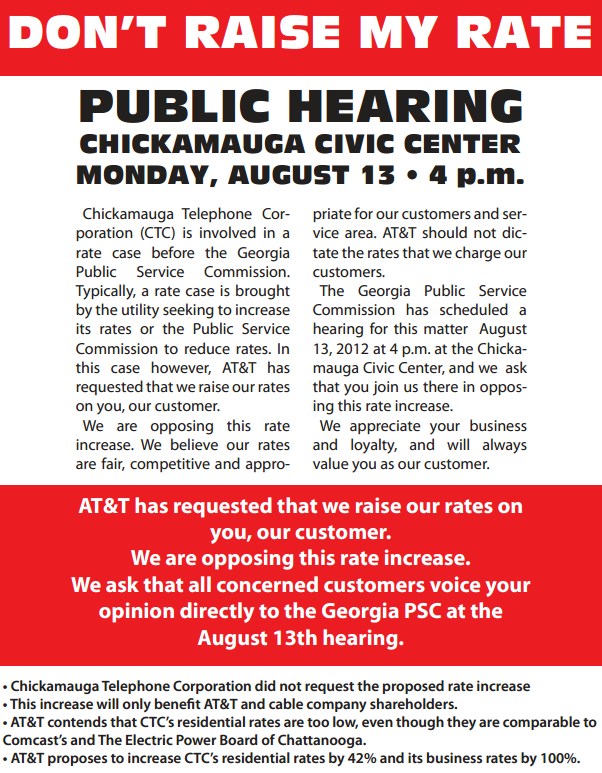 Normally, telephone companies looking for a rate increase file a request themselves with state regulators to charge customers more for service. But in Georgia, AT&T, Comcast, and the state cable lobbying group are asking the Georgia Public Service Commission (GPSC) to order two rural phone companies to raise rates because they are not “charging enough” for phone service, when compared with cable telephone services and AT&T.
Normally, telephone companies looking for a rate increase file a request themselves with state regulators to charge customers more for service. But in Georgia, AT&T, Comcast, and the state cable lobbying group are asking the Georgia Public Service Commission (GPSC) to order two rural phone companies to raise rates because they are not “charging enough” for phone service, when compared with cable telephone services and AT&T.
The Ringgold Telephone Company (RTC) and Chickamauga Telephone Company both argue the action is anti-competitive.
“By forcing [both companies] to increase rates, these competitors are seeking to make wireless and cable companies more attractive to consumers,” says the Don’t Raise My Rate website.
The independent phone companies are vehemently against raising their rates, and executives at both companies are outraged AT&T and the state’s cable companies are literally trying to force the GPSC to order rate increases on residential and business customers.
“It’s totally unprecedented,” Phil Erli, executive vice president at RTC told the Times Free Press. “It is ludicrous and illogical.”
The Georgia Public Service Commission will decide on Oct. 16 whether the rate increases are justified, following local public hearings Aug. 13.

AT&T, which is driving the campaign to force customers to pay higher rates, says they are pressing the case because both companies unfairly charge substantially lower rates than AT&T does in Georgia.
 Peter F. Martin, vice president for legislative and regulatory affairs in Georgia openly admits he wants both companies to charge essentially the same prices AT&T bills its customers in other areas of the state.
Peter F. Martin, vice president for legislative and regulatory affairs in Georgia openly admits he wants both companies to charge essentially the same prices AT&T bills its customers in other areas of the state.
“The premise of my recommendation is that [the two phone companies] raise rates to roughly the same levels that are being charged by other local exchange carriers in surrounding areas,” Martin testified before the GPSC. “In other words, my recommendation is that [the two phone companies] increase their own end-user rates to market-based levels comparable to what other carriers are charging their subscribers.”
 For customers of Chickamauga Telephone, that would amount to a 42% rate increase on residential customers, 100% on business customers. Customers of RTC would pay 20 percent more for residential service, 37% more for business service.
For customers of Chickamauga Telephone, that would amount to a 42% rate increase on residential customers, 100% on business customers. Customers of RTC would pay 20 percent more for residential service, 37% more for business service.
AT&T claims both companies, in deeply rural Georgia, are tapping into the state’s rural service fund and are receiving some of the largest state-mandated telecom subsidies, which are funded by all of Georgia’s phone companies and ratepayers. But both companies claim they have spent a large portion of those funds repairing damages to their rural networks incurred from a series of tornadoes which hit the area two years in a row.
The state cable lobbying group, the Cable Television Association of Georgia (CTAG) also has a dog in this fight. Comcast Cable, the dominant provider in Georgia, directly competes with both phone companies. They support AT&T’s demands that both phone companies hike their rates. It is not difficult to understand why:
Residential Service With Calling Features:
|
CHICKAMAUGA TEL TODAY
|
CHICKAMAUGA TEL
AT&T PROPOSED RATE
|
COMCAST’S CURRENT RATE
|
EPB
|
|
$31.75
|
$37.28
|
$34.95
|
$22.99
|
Business Service With Calling Features:
|
CHICKAMAUGA TEL TODAY
|
CHICKAMAUGA TEL
AT&T PROPOSED
|
COMCAST’S CURRENT RATE
|
EPB
|
|
$88.85
|
$113.30
|
$49.95
|
$35.99
|
 (EPB, a publicly-owned provider from nearby Chattanooga, Tenn., also offers service in some areas.)
(EPB, a publicly-owned provider from nearby Chattanooga, Tenn., also offers service in some areas.)
Chickamauga Telephone executives argue Georgia’s telephone deregulation policies are heavily weighted in favor of huge phone and cable companies and leave independent, rural phone companies with no new revenue opportunities. Chickamauga argues AT&T and the cable industry are using legislatively imposed “unfunded mandates” to win favor and additional profits for themselves and their shareholders, with no resulting savings for Georgia ratepayers, especially in rural areas.
If AT&T and cable operators have their way, both independent phone companies “would be priced out of the competitive market,” and “would soon find [themselves] out of business.”
“If you lived down here and you had a phone with us and your rates went up, how would you respond?” asked Ted Austin, a spokesman for Chickamauga Telephone. “Nobody wants their bills to go up, especially when it’s not something that Chickamauga Telephone is asking for.”
 Public Knowledge, a public interest, pro-consumer group, has filed a petition calling on the Federal Communications Commission to enforce conditions imposed on the Comcast/NBC-Universal merger dealing with Comcast’s usage caps policy.
Public Knowledge, a public interest, pro-consumer group, has filed a petition calling on the Federal Communications Commission to enforce conditions imposed on the Comcast/NBC-Universal merger dealing with Comcast’s usage caps policy.

 Subscribe
Subscribe







